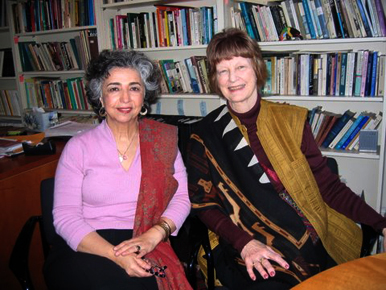BU World: BU at Forefront of UN Push for Women’s Studies
Program will foster education, activism in India

Boston University extends far beyond the Charles River Campus — from students and alums studying overseas to faculty research in developing countries. This week, we look at BU’s presence — in scholarship and in service — around the world.
Three years ago, at a Paris meeting of the United Nations Educational, Scientific and Cultural Organization(UNESCO), Brenda Gael McSweeney described a case study that herstudents were doing in West Bengal. McSweeney, a visiting scholar inthe BU Women’s Studies Programand a former UN executive, told her colleagues that while the projectoriginally involved helping both male and female villagers earn theirlivelihood through customary means, such as practicing traditionalmedicine, it was the women who had become most interested.
“Mycolleagues said this study was exactly what they were looking for:universities that would be more than theoretical ivory towers,”McSweeney recalls. “Universities that would instead provide a two-wayinterface between nongovernmental and civil society activists and thosein academia.” Thus was conceived the Network on Gender, Culture, andPeople-Centered Development, comprising the BU Women’s Studies Programand participating Indian partners.
Now that network has led toBU’s becoming the first university in Massachusetts and the third inthe United States to join a larger UN-funded effort to promote researchin women’s and gender studies. The effort, UNITWIN(university twinning and networking scheme), pairs universities withnongovernmental organizations and community activists worldwide topromote an integrated system of research, training, information, anddocumentation of activities in UNESCO’s spheres of competence. It alsoprovides advice and expertise to assist partner countries in gender,culture, and development studies.
The University is partneredwith three universities and two NGOs in India: Jamia Millia Islamia(JMI), in New Delhi; Punjabi University at Patiala, Punjab;Visva-Bharati University, in West Bengal; the Bhab Initiative, in WestBengal; and the Cultural Resource Conservation Initiative (CRCI)/TheLime Centre, in New Delhi. Coordinated at Boston University byMcSweeney and Shahla Haeri, a College of Arts and Sciences associateprofessor of anthropology and director of the CAS Women’s StudiesProgram, the project has been endorsed by both Koïchiro Matsuura,director-general of UNESCO, and by BU President Robert A. Brown.
“Wethink that this program is what gender and women’s studies are allabout,” Haeri says. “There is so much opportunity for exchanging ideasand learning from our partners in India. We believe ininterdisciplinary and cross-cultural work, and this program ties indirectly with Dr. Brown’s global initiative.”
Officially launchedin September, the partnership hopes, among other things, to help Indianuniversities and nongovernmental organizations develop their ownwomen’s studies programs. “More and more universities from differentcountries that would never have considered a women’s studies program 10or 20 years ago are realizing that there’s a real need and demand forit,” Haeri says. “Now they’re not only establishing centers, butthey’re actively trying to connect with other universities to havemodels to look at and incorporate those into their own needs andobjectives.”
One of the program’s largest undertakings is aninternational symposium planned by Visva-Bharati University forDecember 2008 in West Bengal. The event will include conferences andlectures about women’s livelihoods, rights and political voice, andeducation. Haeri hopes to involve professors and students from both BUand India in scholar exchanges and internships.
“It’sinteresting to see how very grassroots movements resonate with what’shappening now in the highest political levels,” says McSweeney, citingIndia’s 73rd and 74th Constitutional Amendments, which passed in 1992and provide a 33 percent reservation for women in local governmentbodies, among other provisions.
“Community involvement iscrucial,” Haeri says. “And we must involve men as well as women. Afterall, gender involves two sexes, and men have to be involved toappreciate that gender equality is good for the welfare of the familyand the community.”
Vicky Waltz can be reached at vwaltz@bu.edu.
This story originally ran November 11, 2007.
Comments & Discussion
Boston University moderates comments to facilitate an informed, substantive, civil conversation. Abusive, profane, self-promotional, misleading, incoherent or off-topic comments will be rejected. Moderators are staffed during regular business hours (EST) and can only accept comments written in English. Statistics or facts must include a citation or a link to the citation.